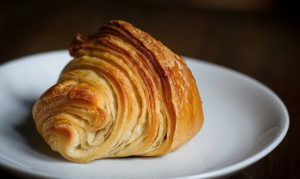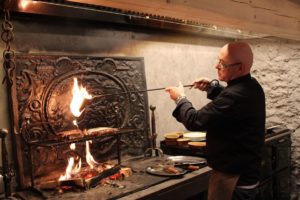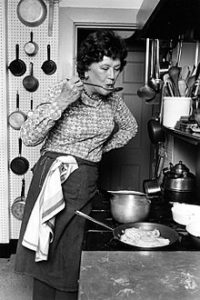By Jasmine Harwood & Sadie Stevens.
Chaired by food historian CHRISTOPHER KISSANE, the second panel of the event celebrated the differences between French and British attitudes to food and cooking. The first speaker was LOIC BIENASSIS, an historian of French regional cuisine, who focused on the correlation between food and national identity in France. Indeed, developing strong links among citizens is essential to the development of a national identity, and food is a tool of patriotism which reinforces cultural and social identities.  Bienassis first explored the terms ‘food identity’ and ‘food heritage’ as socio-historical subjects. In brief, food identity can be explained as ‘food belonging’ and may partially define individuals, although this belonging is actively accepted rather than imposed. Food heritage, on the other hand, is artificial, as heritage status is communally granted to dishes in an act of national and regional preservation. I found this concept of ‘food heritage’ to be entirely foreign; I have never experienced the same national pride that Bienassis described when speaking of French cuisine, and although his conviction of its superiority may have been for comedic effect, I doubt it is far from the truth. This patriotic, unapologetic pride in its national cuisine has allowed France to forge a powerful and enduring culinary heritage, which has been promoted by chefs and restaurateurs worldwide.
Bienassis first explored the terms ‘food identity’ and ‘food heritage’ as socio-historical subjects. In brief, food identity can be explained as ‘food belonging’ and may partially define individuals, although this belonging is actively accepted rather than imposed. Food heritage, on the other hand, is artificial, as heritage status is communally granted to dishes in an act of national and regional preservation. I found this concept of ‘food heritage’ to be entirely foreign; I have never experienced the same national pride that Bienassis described when speaking of French cuisine, and although his conviction of its superiority may have been for comedic effect, I doubt it is far from the truth. This patriotic, unapologetic pride in its national cuisine has allowed France to forge a powerful and enduring culinary heritage, which has been promoted by chefs and restaurateurs worldwide.
Following on from the superiority of French cuisine, the next speaker, Chef JOSHUA OVERINGTON, provided the audience with a British perspective on traditional French cooking techniques versus modern-day techniques. Discussing his classical French training in Paris, Overington explored the reasons why he had originally perceived his training as old fashioned and ‘uncool’. He went on to explain how he took inspiration from tiny French bistros and their reinterpretation of the classics, looking back in history and examining old gastronomy books to find traditional techniques that could revolutionise his food.

The audience learnt about different historical recipes and equipment, such as hare à la royale or a flamboir à lard, and how such techniques could be used to produce unique flavours that modern techniques cannot replicate. Overington’s most intriguing example was a dish that he regularly serves in his restaurant: guinea fowl cooked in a pig’s bladder, used as a traditional alternative to modern day sous-vide techniques. Overington concluded by arguing that it is better to look back in history, in order to both move forward in cooking and to preserve the authentic, regional flavours of a dish. This insightful and personal discussion enlightened me to how valuable and understated historical techniques can be.
Turning our attention to food history on the other side of the channel, Professor DIANE PURKISS discussed the incomprehensible ‘menu French’ that used to appear regularly in the UK. She explored how poor replicas of haute cuisine, which became popular in post-war Britain, led to a declining admiration for French food. Naturally, the repayment of war debts and increased wealth led to a British food renaissance, but ‘English’ cuisine has always been porous and susceptible to foreign influence. In terms of food identity, Britain still considers itself as a trading empire, something which is clearly not reflected in French food identity.  The resemblance of English medieval cuisine to Moroccan cuisine, as well as the foreign origins of tea, were two examples used to illustrate Purkiss’s argument. Just a mere 5-minute walk from the famous Betty’s Tea Room, I thought it was rather appropriate that Purkiss went on to discuss afternoon tea, its origins and its commercialisation. In her concluding remarks, Purkiss stressed the importance of writing down recipes in order to sustain food culture, using the demise of the once-famous York mayne bread as an example. Her discussion left the audience both hungry and eager to write down their treasured recipes as soon as they got home.
The resemblance of English medieval cuisine to Moroccan cuisine, as well as the foreign origins of tea, were two examples used to illustrate Purkiss’s argument. Just a mere 5-minute walk from the famous Betty’s Tea Room, I thought it was rather appropriate that Purkiss went on to discuss afternoon tea, its origins and its commercialisation. In her concluding remarks, Purkiss stressed the importance of writing down recipes in order to sustain food culture, using the demise of the once-famous York mayne bread as an example. Her discussion left the audience both hungry and eager to write down their treasured recipes as soon as they got home.
 Yet while food may empower and unify populations, it is also a site of gender division. FRANCES ATKINS, a Michelin-starred female chef, related her own experience within the field to explore the interweaving of gender history and food history, examining how the position of women in kitchens has shifted through time. Atkins mapped the gendered trajectories of cooking, explaining how the appearance of haute cuisine impeded female influence. In the 18th and 19th centuries, well-travelled male chefs from France dominated the culinary world given their knowledge of a variety of cuisines, while women were considered poorly suited to a job requiring such a degree of manual and administrative know-how. Women were thus confined to low-status domestic cookery, while high-status professional cuisine became the preserve of men, entrenching an asymmetrical culinary infrastructure which persisted for centuries.
Yet while food may empower and unify populations, it is also a site of gender division. FRANCES ATKINS, a Michelin-starred female chef, related her own experience within the field to explore the interweaving of gender history and food history, examining how the position of women in kitchens has shifted through time. Atkins mapped the gendered trajectories of cooking, explaining how the appearance of haute cuisine impeded female influence. In the 18th and 19th centuries, well-travelled male chefs from France dominated the culinary world given their knowledge of a variety of cuisines, while women were considered poorly suited to a job requiring such a degree of manual and administrative know-how. Women were thus confined to low-status domestic cookery, while high-status professional cuisine became the preserve of men, entrenching an asymmetrical culinary infrastructure which persisted for centuries.
The democratisation of the industry over Atkins’ 40-year career has brought greater creativity and experimentation, and the future of food appears more exciting than ever as more women enter top kitchens around the globe. However, Atkins stressed that we must also recognise the female culinary pioneers of the past, and on this note, the panel delved into further discussion of women in the history of food; in particular, how to include these remarkable women in historical narratives and ensure that their contributions do not go ignored or dismissed. The speakers questioned the utility of recipe books as sources, acknowledging that as many food historians do not attempt the recipes they encounter, they do not appreciate how they shaped cultural and regional identities. York-based chefs Overington and Atkins mused on how location influences food, concluding that the ‘taste of Yorkshire’ is achieved by using its water and the surroundings to achieve the maximum potential of an ingredient, and therefore proving that food identity cannot be understood merely through studying recipe books.
The discussion was later opened up to the audience, who asked the panel a variety of questions. Key themes included the role of men in the domestic kitchen, where to source quality ingredients, the rise of artificial foods and perspectives on vegetarian diets. The event concluded with a reflection of how food can be a fascinating way to think about ourselves and our identity, and how similar debates about food are echoed throughout history.


